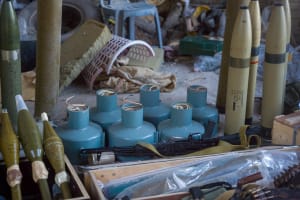Israeli Arava desert residents fear Oct. 7-type invasion from Jordan

Israeli citizens residing in the nation's isolated eastern Arava Desert fear that an Oct. 7-style terror invasion is just around the corner, this time emanating from the Kingdom of Jordan, which signed a formal peace agreement with Israel in 1994.
Neta Turkletoyev who lives in Be’er Ora, a small rural community close to the Jordanian border, shared the escalating concerns among his fellow community members.
"We're all lost. We don't understand what's happening. We often hear explosions without any sirens, only learning what it was about after the fact. We're afraid. It reminds us of the days before October 7, when we’ve done nothing about missiles being launched against us. We feel like something big will happen soon," Turkletoyev said.
There are striking similarities between Arava Desert communities and the Israeli communities adjacent to the border with the Gaza Strip. Both areas are sparsely populated and vulnerable due to their respective locations close to potentially dangerous borders. A mere 6,000 Israelis live in the southern Arava region which shares a 120 km (75 mile) largely unguarded border with the Hashemite Kingdom of Jordan.
Despite the formal Jordanian-Israel peace agreement, anti-Israel sentiments are widespread and have increased among regular Jordanians after Oct. 7. In addition, the Jordanian border has become a popular route for weapons smuggling into Israel.
In December, Israeli security forces foiled the largest-ever weapon smuggling attempt from Jordan. Israel Police seized a whopping 137 weapons including 17 M-16 rifles, 120 pistols and 250 cartridges.
"We find the same types of weapons with the terrorists and with terrorist organizations in Judea and Samaria - and also with criminal elements in the sector," an Israeli police official explained.
Earlier this week, a drone exploded inside Jordanian territory but close to the Israeli international Ramon Airport near the southern city of Eilat. On April 1, Iranian-backed terrorists in Iraq launched a drone that struck a building belonging to the Israeli Navy.
"We’re a bit more vigilant regarding what’s happening in the sky following the events of the last three weeks. The general public is more attentive as well," said Sagiv Levy, a security chief at Kibbutz Lotan, close to the Jordanian border.
Dror Shmueli, the security head of the local Hevel Eilot Regional Council, noted that local security awareness has increased across the region since Oct. 7.
“They feel insecure, thinking such aircraft are passing directly over our heads, and this seems to be escalating from one incident to the next. Our kibbutz is located right next to the border. We understand the threat also comes from the east, and we’re essentially located on the front line,” the local security chief added.
"Since October 7, we’ve bolstered our readiness," Shmueli said but expressed concerns about the limited presence of Israeli forces along the eastern border with Jordan.
“IDF forces are scarce in this area. The police are absent. Response time and distance are critical during an emergency. Most of our communities are close to the border fence. The government and the world are slowly beginning to understand what we’ve been saying out loud,” said Shmueli.
“The border is abandoned, the IDF neglects the local alert squads and isn’t giving enough equipment. The government realized this on October 7. If a terrorist cell arrives without warning, it will take forever for the military to arrive."
"We demanded they station a brigade in the area because the space in the Arava is vast. Our residents see armed Jordanian soldiers driving around in armored jeeps instead of Israeli forces," he added.

The All Israel News Staff is a team of journalists in Israel.













